Key takeaways:
- Regular maintenance is crucial for managing service costs, preventing larger repair expenses, and ensuring vehicle reliability.
- Service costs vary based on complexity, location, and parts quality; OEM parts offer better compatibility but at a higher price.
- Establishing a good relationship with service technicians can lead to insights on future needs and potential savings.
- Maintaining detailed service records can enhance resale value and provide peace of mind regarding vehicle health.
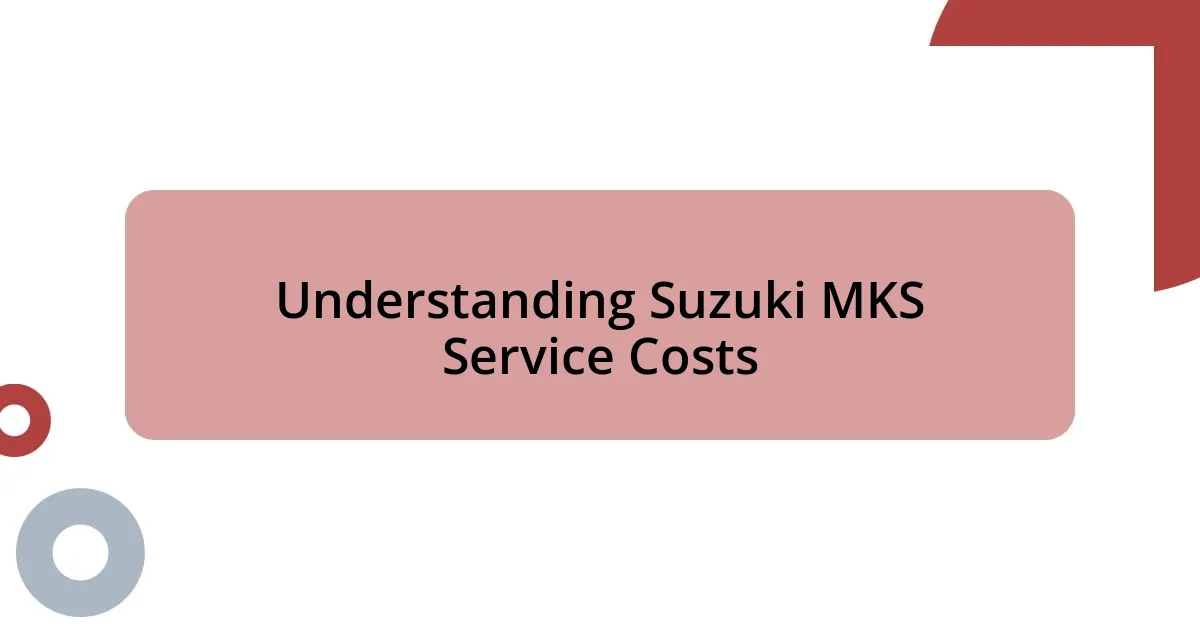
Understanding Suzuki MKS Service Costs
Understanding Suzuki MKS service costs can sometimes feel overwhelming, especially if you’re new to the brand. I remember my first service, staring at that bill; it was much higher than I anticipated. Have you ever had that moment where you’re just trying to make sense of it all?
I quickly learned that regular maintenance is key to managing costs over time. A simple oil change or tire rotation might seem trivial, but they can prevent major repairs down the road. The peace of mind knowing that your MKS is running smoothly can be worth every penny.
When I started getting my regular service done, I also learned about the different packages they offered. Each package had its own set of costs, depending on factors like mileage and specific needs of the vehicle. Understanding these options really empowered me to make better decisions about my car’s care. Have you explored the service packages for your Suzuki yet? Understanding what’s available can really help in planning your budget.
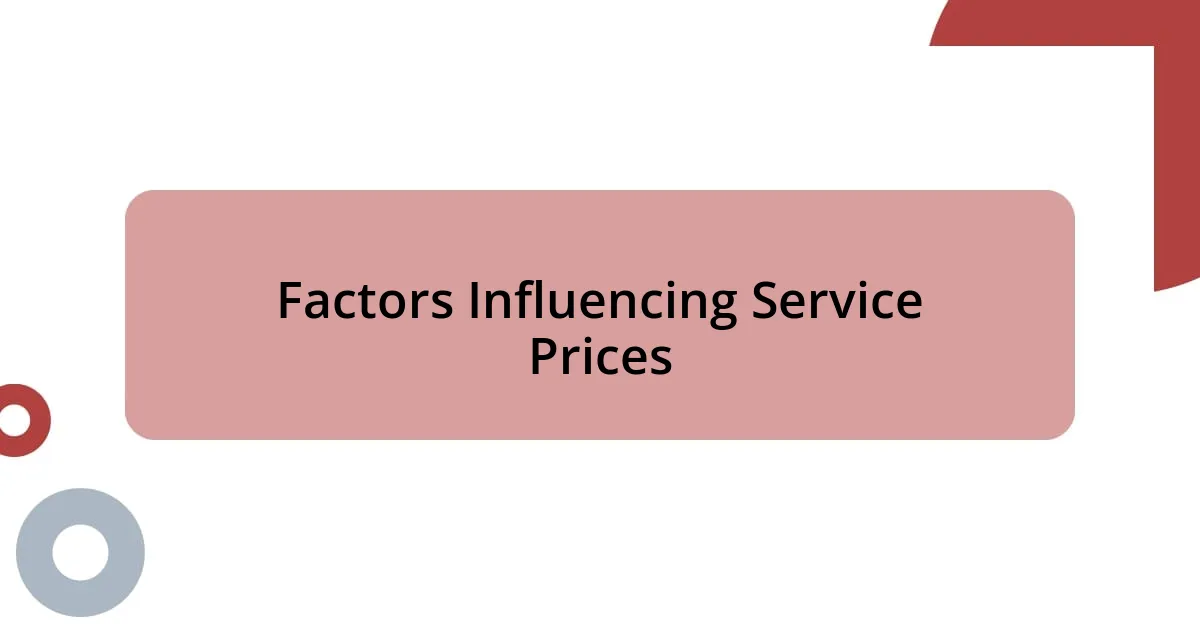
Factors Influencing Service Prices
The service costs for Suzuki MKS can vary significantly based on several factors. For instance, the complexity of the service itself plays a big role. I vividly remember the time I opted for a major service that included checking all systems and replacing worn-out parts. It was an eye-opener seeing how intricate the process was, and it made me appreciate the value of that higher bill.
Another element influencing service costs is the location of the service center. I had my MKS serviced in both a small-town shop and a dealership in the city. The difference in labor costs was striking! While the small shop offered competitive rates, the dealership provided specialized expertise that, in my opinion, justified the higher price. It’s essential to weigh the benefits of each option based on your preference and trust in the service provider.
Lastly, the type of parts used during service can affect overall costs. When I needed a part replacement, I was given the choice between OEM (Original Equipment Manufacturer) parts and aftermarket options. I opted for the OEM parts because I wanted to ensure the best compatibility and reliability for my vehicle. This choice came at a premium, but to me, it felt like an investment in my MKS’s longevity.
| Factor | Influence on Cost |
|---|---|
| Service Complexity | Higher for comprehensive checks and repairs |
| Location | Varies between small shops and dealerships |
| Parts Quality | OEM parts carry a premium compared to aftermarket options |
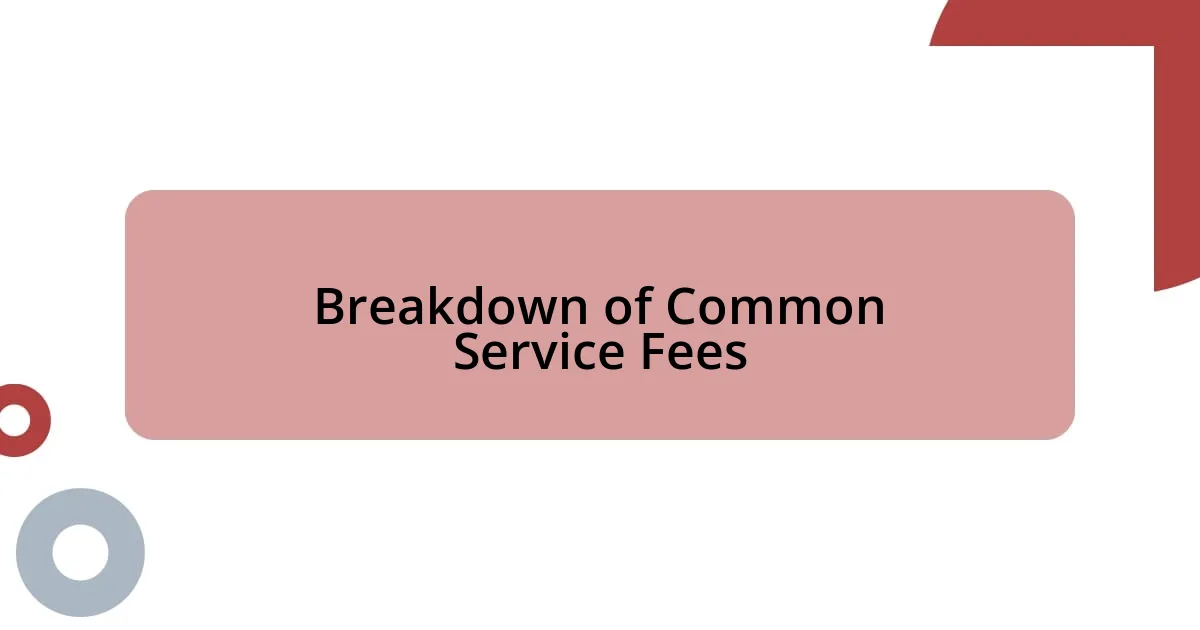
Breakdown of Common Service Fees
When I first received the detailed invoice after my routine service at the dealership, it was a bit of a shock. The breakdown of costs laid bare the importance of each service performed. Each line item carried its own story, reminding me that the investment in maintenance is not just about fixing issues but also about preventing future headaches.
Here are some common service fees you might encounter:
– Oil Change: $50-$100
– Tire Rotation: $20-$50
– Brake Inspection: $30-$80
– Battery Replacement: $100-$200
– Fluid Flushes (coolant, transmission, etc.): $100-$150
Seeing this list helped me to grasp where my money was going. It also made me appreciate the roles these services play in keeping my MKS in pristine condition. I remember thinking, “Absolutely worth it!” as I drove away, knowing I was taking proactive steps to avoid larger expenses down the road.
Sometimes, I would receive a surprise fee for something unexpected, like a filter replacement. While it could be frustrating in the moment, I’ve learned that being proactive and asking about these common charges upfront can smooth out the experience greatly. Each service had its place, and having a candid conversation with the technician really helped demystify the costs. Here’s an even more detailed look at my own service experience:
- Major Service Package: $300-$600 (includes comprehensive checks)
- Diagnostic Fee: $80 (applied to repairs if they proceed)
- PMS (Preventative Maintenance Services): $150-$400 (depends on mileage and specific upkeep)
Understanding these fees really changed my perspective. Once I realized that skipping even a small service could lead to bigger issues, I embraced my regular visits with a sense of responsibility rather than dread. It’s all about looking after my investment, something we all know is crucial for a smooth ride.

Comparison With Other Brands
When I started comparing the service costs of my Suzuki MKS with other brands, I was genuinely surprised at the differences. For instance, some friends with Honda vehicles often talked about lower maintenance bills, especially for simple tasks like oil changes or tire rotations. I found myself wondering, is it really just the brand, or do they have a more straightforward servicing approach?
Interestingly, while my Suzuki MKS sometimes leaned on the pricier side, it came with exceptional customer service and specialized knowledge. I recall an experience at a Toyota service center; their costs were competitive, but I felt like just another number in their system. When I go to my Suzuki dealer, I see the same technicians, and they remember my name! That personal touch adds value that’s hard to quantify but makes a real difference in my overall satisfaction.
Then there’s the discussion about parts. Many of my friends choose aftermarket options with their Ford cars, claiming to save a bundle. I did the same comparison for my MKS, but after reading horror stories about compatibility issues and unexpected repairs, I decided to stick to OEM parts. It’s funny how peace of mind often outweighs the dollars saved. Have you ever thought about how much you value reliability over cost? For me, that’s become a significant factor in service-related decisions.
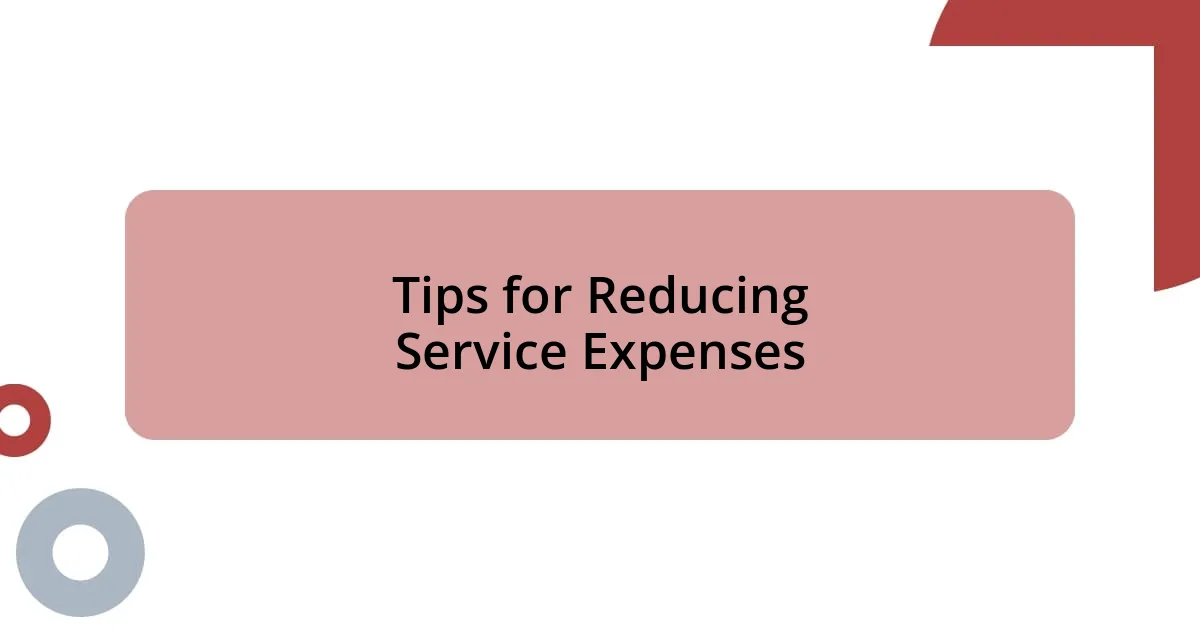
Tips for Reducing Service Expenses
One of the best ways I’ve found to reduce service expenses is by following a strict maintenance schedule. I keep a log, marking off when each service is due. Not only does this prevent unnecessary emergency repairs, but it also allows me to catch small issues before they become costly problems. Have you ever faced a hefty bill because you ignored a minor warning light? I sure have, and it taught me the value of regular check-ups.
Another tip is to establish a relationship with your service technician. I always make it a point to chat with mine whenever I visit. This rapport goes a long way; they often give me heads-up about common upcoming maintenance needs. It’s like having a buddy on the inside. Sometimes, just asking the right questions can lead to discounts or packages that save you bucks in the long run.
Lastly, I’ve learned that being a part of a loyalty program can provide significant savings. My dealership has a rewards system that gives me points for every service I complete, which I can then redeem for discounts on future visits. The first time I used my points, it felt like getting a surprise gift! So, why not check with your service provider? You might find hidden perks that ease the burden on your wallet.
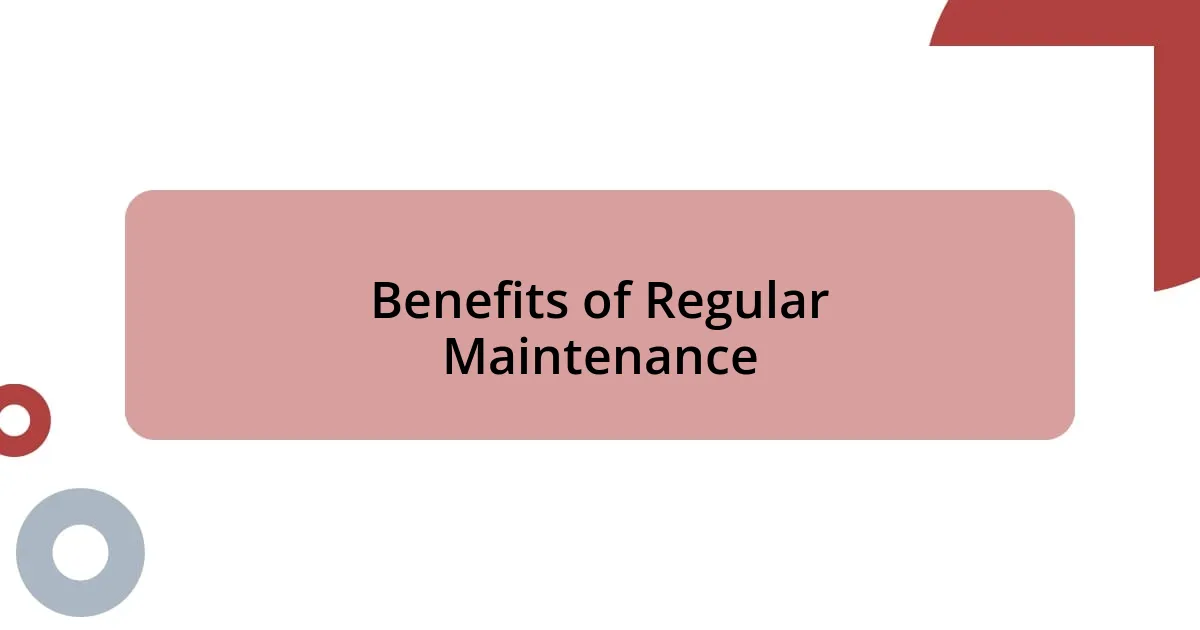
Benefits of Regular Maintenance
Regular maintenance offers a chance for peace of mind. I remember feeling a wave of relief each time I’d finish a scheduled service for my Suzuki MKS. Knowing I’d tackled the basics—like oil changes and brake inspections—meant I could hit the road without worrying about sudden breakdowns. Have you ever been on a drive, only to be startled by a dashboard warning light? It’s a sinking feeling that regular check-ups can help avoid.
Another benefit I’ve noticed is the way regular maintenance boosts my vehicle’s resale value. When I first bought my MKS, I meticulously kept service records, and when I decided to sell, I was genuinely amazed at how interested buyers were in that documentation. It spoke to my car’s overall health and reliability—a real asset. Wouldn’t you agree that a well-maintained vehicle tells a better story than one riddled with service gaps?
Ultimately, sticking to a maintenance routine fosters a stronger connection with my automobile. There’s something undeniably rewarding about understanding my car better through regular check-ups. Each visit to the service center deepens my appreciation for how all the intricate components work together. Does it ever make you feel more in tune with your vehicle when you put in that extra effort? For me, it transforms driving from a simple task into a more engaging experience.














